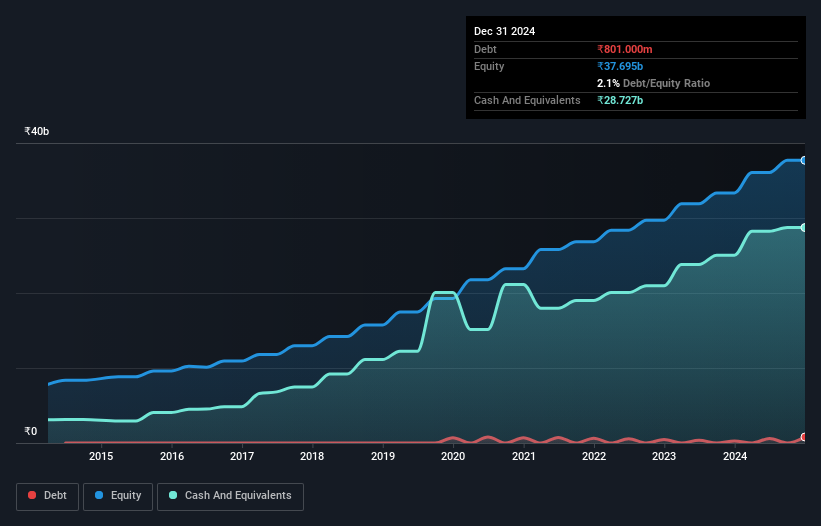- India
- /
- Electronic Equipment and Components
- /
- NSEI:HONAUT
Honeywell Automation India (NSE:HONAUT) Could Easily Take On More Debt
David Iben put it well when he said, 'Volatility is not a risk we care about. What we care about is avoiding the permanent loss of capital.' When we think about how risky a company is, we always like to look at its use of debt, since debt overload can lead to ruin. As with many other companies Honeywell Automation India Limited (NSE:HONAUT) makes use of debt. But the more important question is: how much risk is that debt creating?
Why Does Debt Bring Risk?
Debt is a tool to help businesses grow, but if a business is incapable of paying off its lenders, then it exists at their mercy. Part and parcel of capitalism is the process of 'creative destruction' where failed businesses are mercilessly liquidated by their bankers. However, a more common (but still painful) scenario is that it has to raise new equity capital at a low price, thus permanently diluting shareholders. Having said that, the most common situation is where a company manages its debt reasonably well - and to its own advantage. The first step when considering a company's debt levels is to consider its cash and debt together.
View our latest analysis for Honeywell Automation India
What Is Honeywell Automation India's Net Debt?
As you can see below, at the end of September 2024, Honeywell Automation India had ₹801.0m of debt, up from ₹259.0m a year ago. Click the image for more detail. But it also has ₹28.7b in cash to offset that, meaning it has ₹27.9b net cash.

How Healthy Is Honeywell Automation India's Balance Sheet?
According to the last reported balance sheet, Honeywell Automation India had liabilities of ₹12.1b due within 12 months, and liabilities of ₹890.0m due beyond 12 months. Offsetting this, it had ₹28.7b in cash and ₹9.96b in receivables that were due within 12 months. So it can boast ₹25.7b more liquid assets than total liabilities.
This surplus suggests that Honeywell Automation India has a conservative balance sheet, and could probably eliminate its debt without much difficulty. Simply put, the fact that Honeywell Automation India has more cash than debt is arguably a good indication that it can manage its debt safely.
The good news is that Honeywell Automation India has increased its EBIT by 7.2% over twelve months, which should ease any concerns about debt repayment. The balance sheet is clearly the area to focus on when you are analysing debt. But ultimately the future profitability of the business will decide if Honeywell Automation India can strengthen its balance sheet over time. So if you want to see what the professionals think, you might find this free report on analyst profit forecasts to be interesting.
Finally, a business needs free cash flow to pay off debt; accounting profits just don't cut it. Honeywell Automation India may have net cash on the balance sheet, but it is still interesting to look at how well the business converts its earnings before interest and tax (EBIT) to free cash flow, because that will influence both its need for, and its capacity to manage debt. During the last three years, Honeywell Automation India produced sturdy free cash flow equating to 69% of its EBIT, about what we'd expect. This cold hard cash means it can reduce its debt when it wants to.
Summing Up
While it is always sensible to investigate a company's debt, in this case Honeywell Automation India has ₹27.9b in net cash and a decent-looking balance sheet. The cherry on top was that in converted 69% of that EBIT to free cash flow, bringing in ₹3.0b. So is Honeywell Automation India's debt a risk? It doesn't seem so to us. Above most other metrics, we think its important to track how fast earnings per share is growing, if at all. If you've also come to that realization, you're in luck, because today you can view this interactive graph of Honeywell Automation India's earnings per share history for free.
Of course, if you're the type of investor who prefers buying stocks without the burden of debt, then don't hesitate to discover our exclusive list of net cash growth stocks, today.
Valuation is complex, but we're here to simplify it.
Discover if Honeywell Automation India might be undervalued or overvalued with our detailed analysis, featuring fair value estimates, potential risks, dividends, insider trades, and its financial condition.
Access Free AnalysisHave feedback on this article? Concerned about the content? Get in touch with us directly. Alternatively, email editorial-team (at) simplywallst.com.
This article by Simply Wall St is general in nature. We provide commentary based on historical data and analyst forecasts only using an unbiased methodology and our articles are not intended to be financial advice. It does not constitute a recommendation to buy or sell any stock, and does not take account of your objectives, or your financial situation. We aim to bring you long-term focused analysis driven by fundamental data. Note that our analysis may not factor in the latest price-sensitive company announcements or qualitative material. Simply Wall St has no position in any stocks mentioned.
About NSEI:HONAUT
Honeywell Automation India
Manufactures and sells industrial process control and automation systems in India and internationally.
Flawless balance sheet established dividend payer.
Similar Companies
Market Insights
Community Narratives



